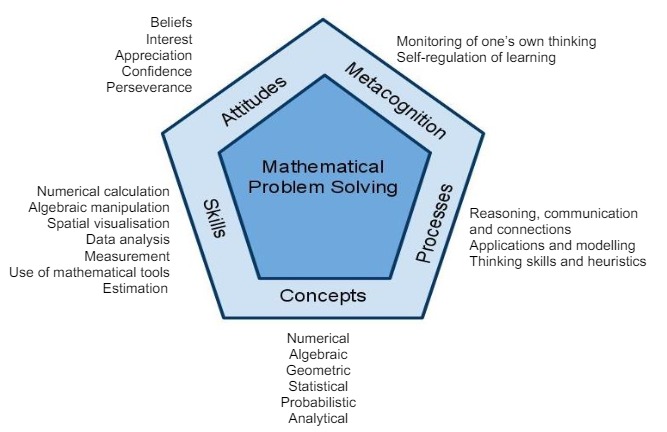Mathematics
Department Overview
“Mathematics contributes to the development and understanding in many disciplines and provides the foundation for many of today’s innovations and tomorrow’s solutions. It also underpins many aspects of our everyday activities, from making sense of information around us to making informed decisions about personal finances”. (CPDD, MOE 2021)
In primary mathematics education, problem-solving proficiency is nurtured through interconnected elements: concepts, skills, processes, metacognition, and attitudes. Essential components include grasping mathematical concepts, mastering operations and algorithms, and employing abstract reasoning. Metacognition aids in selecting strategies, while positive attitudes drive motivation and perseverance in problem-solving endeavors.

As such, the mathematics teachers seek to engage our students to do Mathematics so that they will be able to:
-
acquire and apply math concepts and skills well
-
engage actively in mathematics problem solving that involve logical reasoning and creative thinking
-
develop metacognitive thinking that promote self-directed learning and reflection
-
develop the interest and confidence in learning math
Curriculum and Pedagogy / Approach
Key pedagogical approaches
Mathematical concepts are abstract. To develop an understanding of these abstract concepts, teaching and learning starts from concrete objects, examples and experiences that students can relate to. The concrete-pictorial-abstract (CPA) approach is an important consideration in the sequencing of learning. For example, in learning Fractions, concrete manipulatives such as fraction discs and fraction bars are used in helping students make sense of fractions and the concepts involving fractions.
In learning other concepts such as Geometry and Measurement, students use concrete models and manipulatives such as Anglegs and square tiles to explore and discover geometric shapes and properties and make connections between concepts through hands-on activities.
For Statistics, students will learn to conduct simple survey where they collect data and/ or use ICT tools to represent the data in the form of a bar graph, line graph or pie-chart. Through these, they reason about how data can be collected systematically, and which types of graphs convey the data analytics most clearly.
RCC (Reasoning, Communication, Connection)
In response to the evolving educational landscape, our department recognised the limitations of traditional teacher-centric approaches in meeting the diverse learning needs of today's students. In pursuit of fostering preparedness for the challenges of the 21st century, RCC is used in daily classrooms. This embodies a pedagogical shift towards inquiry-based learning, meticulously curating comprehensive lesson packages for specific topics.
These packages are meticulously crafted to cultivate confident communicators with strong reasoning abilities. Leveraging technology, our approach emphasises student-centric activities enriched with authentic learning experiences. By anchoring learning in relevance to students' lives, engagement and meaningfulness are heightened. Our overarching goal is to empower students to actively engage with mathematics through stimulating discussions and activities that encourage exploration, reasoning, and communication. Through collaborative endeavours with peers, the math department hopes to create a dynamic learning environment where students are encouraged to discover possibilities and forge connections.

S.P.A.R.K.
NVPS Problem Solving Thinking Routine

Problem-solving is not just about finding answers; it's about developing a systematic approach to tackle complex problems. One effective thinking routine is to encourage students to follow a structured process. The problem solving thinking tool in North View Primary School has been developed by our school teachers, with reference to George Polya’s4 principles of problem solving (1945) and ‘BEST’ checklist (NIE, Dr Joseph Yeo). The purpose of the tool is not about the acronyms but the questions embedded that students need to ask themselves when attempting a problem sum.
By practicing this problem-solving routine on a regular basis, students not only enhance their mathematical skills but also cultivate critical thinking, creativity, and resilience. Through regular application of this routine, students become adept problem solvers, equipped to tackle challenges across various domains of mathematics and beyond.
Key programmes
-
Play Pedagogy for lower Primary P1 and P2 (The use of “play” activities to introduce mathematics concepts to Lower Primary students)
-
Escape Room learning packages for P3 and P4 (the use of gamification to sustain interest in mathematics learning)
-
E2K Math for higher ability students (conducted by own school teachers after they have undergone training)
-
Math Olympiad Training P4 and P5 for higher ability students (conducted by licensed external trainers)
-
Problem Solving Worksheets (Infused with SPARK to develop metacognitive thinking)

